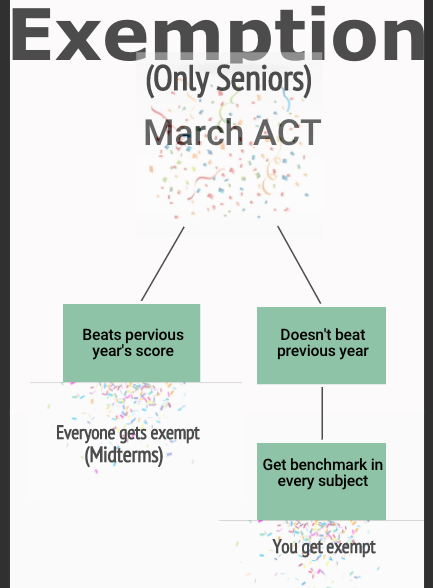R.I.P Exemptions
October 15, 2018
If you’re not a senior, say goodbye to exemptions and hello to a stressful 2nd semester.
The new Highlands High School exemption policy only allows seniors to be exempt. Now it relies more heavily on their ACT scores rather than individual grades. However, this decision was not made at a state or local level and the reason for its elimination isn’t known by most students.
Coach and business teacher Jamie Richey was one of the people making the decision about the policy. Richey said this regarding the exemption policy.
“Input from graduates who said they weren’t prepared to take tests in college pushed us to make a decision about the policy.”
The exemption policy was voted on by the SBDM. Understandably, students have no idea what that is. An SBDM, or Site Based Decision Making Council, which makes a variety of High School specific decisions. The committee is made up of the principal, three local teachers, and two parents of current students. Coach Richey being one of the three teachers, along with English teacher, Lauren Peterson and math teacher, Pat Agard.
SBDMs are unique to Kentucky and brag to be an effective school legislature, but why the lack of student representation and knowledge about these decisions?
It is likely the majority of students had no idea that exemptions were a topic up for debate, but the decision to do away with them was 5-0.
Five for it, and no one against.
Having student representation might have changed that. Many students believe they have a right to control or at least know about their education. Hiren Lemma, junior, stated, “I’m upset that they didn’t let us know beforehand because it may have affected my choice in workload.”
Students also may not be aware of the actual rules of exemptions for seniors.
If the senior class does better than the previous class in the March ACT, then everyone with an 80% or higher in every class will be exempt from 1st-semester exams. If your class does not beat the previous class and you meet benchmark in every subject, you will still be exempt from 1st-semester exams. Everyone is exempt from 2nd-semester exams unless it is needed to pass the class.
Hannah Hartman, senior, is disappointed by the new change. She stated, “It shouldn’t be based on the March ACT; it should be based on your best ACT score.”
Controversially, even if the scores are better from another ACT, it doesn’t matter. The March ACT date is the only one that counts.
Due to the fact that every public high school in Kentucky has a different SBDM, exemption policies vary greatly on a school to school basis. Various schools public and private, have a variety of policies. Covington Catholic High School in Park Hills, Ky.’s policy mimics what Highland’s used to be. No exemptions for midterms. Any class that you have a 93-100 percent in you can get exempt from, but attendance plays no role. Campbell County High School, Alexandria, Ky.’s policy states that you can get exempt from only 3 classes. The scale is still 93-100 percent, but you cannot have any unexcused absences. However, schools like Conner High School in Hebron, Ky. don’t have exemptions at all.
Out of all the exemption policies in our area, statistically, Highlands was by far the hardest to obtain. Yet, this is unimportant because it is likely never coming back and many students agree it’s for the worst.
Junior Rachel Moscona stated, “I’m less motivated to get an A in the class or come to school, to be quite honest.”
Anne Marie Dauer, sophomore, said, “I feel like we should have exemptions because it motivates students and makes them try harder and plus it’s a reward.”
Although the lack of exemptions may prepare students for college, without them, students are feeling even less motivated and have no desire to even come to school. This change may be good or bad, but regardless, it’s time to start saying final goodbyes because it sure isn’t coming back any time soon.
Correction per Matthew Bertasso: The March ACT is used by the state to evaluate Highland High school’s scores. Any ACT score obtained by a student prior to or after the March ACT are null and do not count towards the overall score for the school no matter how beneficial to the school it may be.



